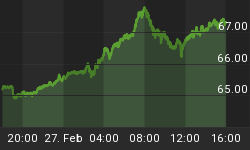Curve Watcher's Anonymous notes some interesting reactions in the treasury bond market following a string of good job reports.
Today the jobs numbers once again beat expectations: Nonfarm Payrolls Rose by 248,000 and the unemployment rate fell to 5.9%.
In seven out of the last eight months, jobs rose by over 200,000. Last month was the exception, but even then, the initial job report was revised up 69,000 to +180,000.
In light of such purportedly strong data, especially with the Fed tapering ending this month and expectations across the board of fed hikes, yield on the long bond should be rising.
The yield curve also should be steepening, at least if one believes in the recovery. Let's take a look to see what is actually happening.
30-Year Treasury Yield

Note: The above chart is off by a factor of 10. At the time I snapped that chart, the 30-year treasury yield was 3.143%
Yield on the 30-year long bond shot up on the job report but is now in the red for the day. This is not what one would expect following a strong jobs report.
Nonetheless, one day does not prove much. Let's take a look at the 5-year and 30-year treasuries over time.
30-Year and 5-Year Treasury Yields Since 2010

The long-term trend since 2010 has been a gentle flattening of the curves.
Moreover, since the beginning of the year the spread between 30-year and 5-year treasuries has decreased significantly as the following chart shows in detail.
Treasury Spread 30-Year Minus 5-Year

The above chart shows weekly closes. The last data point is from September 26.
At the end of the day, the spread will be a bit lower than shown above. I currently have the spread at 1.396 (3.133 on the 30-year minus 1.737 on the 5-year), down about 10 basis points this week.
Instead of the curve steepening as one would expect in a recovery, the 5-30 spread curve has been declining since hitting a peak of 3.0 in November of 2010.
Conclusion
The bond market does not think much of an ongoing recovery or future price inflation prospects, and neither do I.
By the way, I occasionally get asked "Who is Curve Watcher's Anonymous?" The answer is me.















